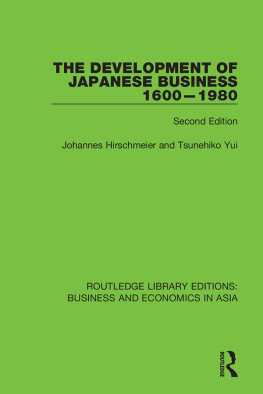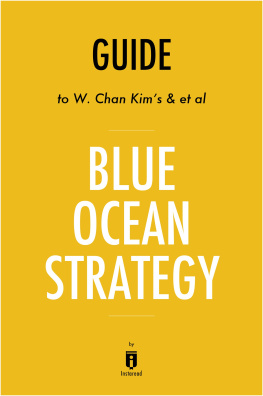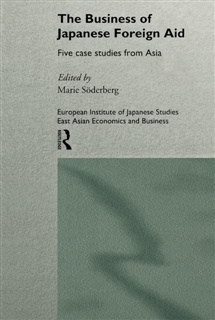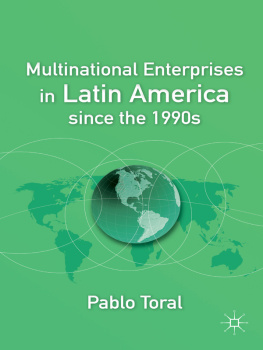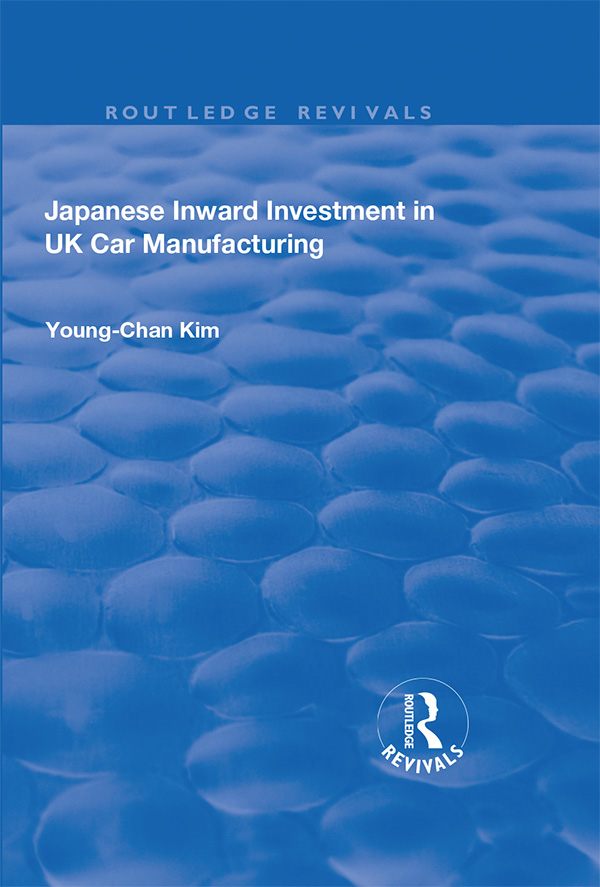Contents
JAPANESE INWARD INVESTMENT IN UK CAR MANUFACTURING
Japanese Inward Investment in UK Car Manufacturing
YOUNG-CHAN KIM
Royal Holloway, University of London, UK

First published 2002 by Ashgate Publishing
Reissued 2018 by Routledge
2 Park Square, Milton Park, Abingdon, Oxon 0X14 4RN
711 ThirdAvenue, New York, NY 10017, USA
Routledge is an imprint of the Taylor & Francis Group, an informa business
Copyright Young-Chan Kim 2002
All rights reserved. No part of this book may be reprinted or reproduced or utilised in any form or by any electronic, mechanical, or other means, now known or hereafter invented, including photocopying and recording, or in any information storage or retrieval system, without permission in writing from the publishers.
Notice:
Product or corporate names may be trademarks or registered trademarks, and are used only for identification and explanation without intent to infringe.
Publishers Note
The publisher has gone to great lengths to ensure the quality of this reprint but points out that some imperfections in the original copies may be apparent.
Disclaimer
The publisher has made every effort to trace copyright holders and welcomes correspondence from those they have been unable to contact.
A Library of Congress record exists under LC control number: 2001096369
ISBN 13: 978-1-138-73008-3 (hbk)
ISBN 13: 978-1-315-18835-5 (ebk)
To my wife, Suh Chang-Hee, Prima et Semper
List of Figures
List of Tables
Contents
Whilst the developed countries advocated a free trading system, there has been a growing economic regionalism. NAFTA, ASEAN, and the EU have been developed as single blocs. The single European market movement since the early 1980s put nonmember countries under pressure. Under the name of globalisation, Japanese companies flooded into the European Union. As contrasted with the strategy in the US, Japanese multinational enterprises movement towards the EU were harmonised with political action by the Japanese government. Dumping accusations and voluntary export restraints made the Japanese government urge on her MNEs more positive action towards the EU a push factor for foreign direct investment. While the Japanese government pushed her MNEs into the EU, all European industrial problems such as the high rate of unemployment, de-industrialisation, and shrinking consumer markets were expected to be solved by the new wave from the East, the pull factor. Within the push factor, the Japanese government, especially MITI, was brought into action again as a business negotiator. Because of the strong incentive from member countries (pull factor), the policy towards inward foreign direct investment was matched to the Japanese push factor. There was a small pinhole in fortress Europe, namely Japanisation.
The UK has been favoured because of her strong pull factor policy toward foreign investors, especially Japan. Ironically, while the UK lost her nationalised car manufacturers, there are now three big Japanese car makers in the UK. The British car industry was in turmoil and government intervention toward car manufacturing sectors was not supported by a clear industrial policy for the sector itself. As far as Japanese car makers were concerned, the UK had, then, a weak nationalised car maker, open-minded consumer taste, relatively free market competition, well-organised components industries and most of all, a strong government incentive policy. The Rover and Honda collaboration, and the Nissan greenfield investment, show us good comparative examples of Japanese strategy toward the EU. Because of the failure of the successive inward investment from the components industry, the lack of technical collaboration, and mismanagement from UK government (Rover and Honda case), the Japanese car makers in the UK are just assembly warehouses rather than manufacturing sites.
Though I am responsible for what follows in this book, there are numerous people who have contributed in a variety of ways to its realisation. Two people made contributions without which the project would have been impossible. Professor John Turner was, despite a formidably full schedule, generous with his time and advice, having ploughed through numerous drafts. Professor Charles Harvey was an invaluable source of ideas, inspiration, imagination, invention and often pure intuition.
My deepest thanks must go to the various interviewees, from former Cabinet Ministers, representatives and staff of car and component industries in the UK, research fellows in various institutes, and members of trade associations to managers in local government. Quite patently, without their courteous attention and interest in my questions, none of the present study would have been even remotely possible and I extend them my warmest gratitude.
The comments and personal conversations with ex-Cabinet ministers, Sir Edward Heath (Prime Minister 197074), Lord Biffen (Trade Secretary 198182, Leader of House of Commons 198287), Lord Howe (Chancellor of the Exchequer 197983, Foreign Secretary 198389, Leader of House of Commons 198990), Lord Parkinson (Party Chairman 198183, Trade and Industry Secretary 1983, Energy Secretary 198789, Transport Secretary 198990), Lord Tebbit (Employment Secretary 198183, Trade and Industry Secretary 198385, Party Chairman 198587), Lord Walker (Agriculture Secretary 197983, Energy Secretary 198387), Lord Young (Employment Secretary 198587, Trade and Industry Secretary 198789), government technocrats in IBB, DTI and local government staffs have played significant roles in my study. I am, also, deeply indebted to individuals from Honda UK staff, Nissan UK and British and Japanese component affiliates in Britain.
On a broader front, due thanks must be extended to the staff of DTI Library, House of Commons Information Service, Press Association, TUC Library in North London University, European Union Library in London, London Business Library, KPMG Japan Desk, Japan Information Services at Japan Embassy, JETRO Library, Anglo-Japanese Institute Library, Diawa Anglo-Japanese Foundation Library, Swindon Local Library, Economic Development Thamesdown Brough Council, Northern Development Company, Sunderland University Library.
For the insights they provided, I am indebted to the speakers, the guests and the organisers of various seminars from the Anglo-Japanese Economic Institute, the Asia-Pacific Technology Forum and the Daiwa Anglo-Japanese Conference.
The editorial staff at Ashgate, especially Kirstin Howgate, Jacqui Cornish and Sarah Charters, have been very helpful throughout the writing process. Lastly, family were a welcome source of strength and support, and friends in Korea, and in the UK, who always stood by me and supported me when I needed them.
My final thanks go to my wife, Chang-Hee Suh and two children, Seung-Gyum and Yong-Gyum, whose support and endless sacrifices were enormous. Especially, while my first son would annoy me during the day, my second son would do so at nights, the same as his brother had done before. I hope to be a nice father to them. Special thanks go to my wife, because she has made me what I am.
I have drawn much, both consciously and unconsciously, on the thoughts of others, to whom I am grateful. However, the judgements, conclusions and faults are naturally my own.
List of Abbreviations


